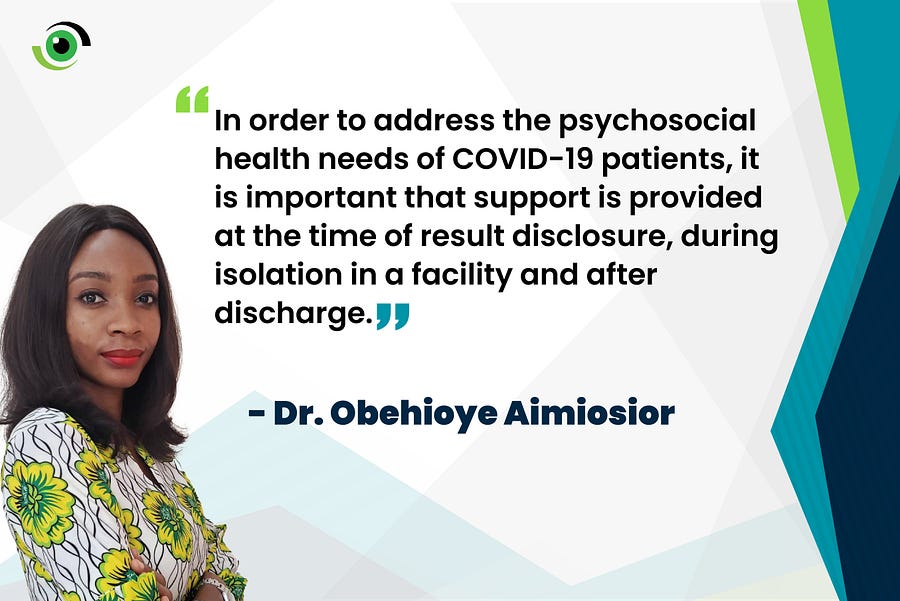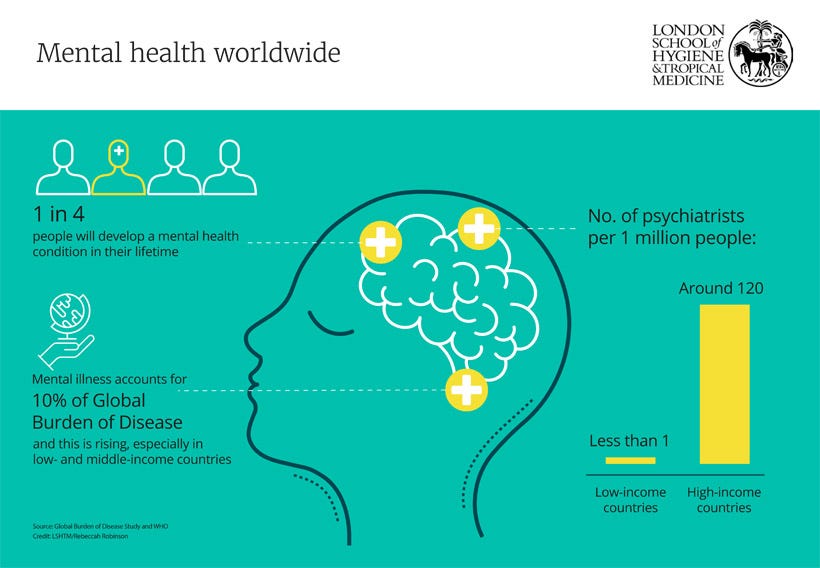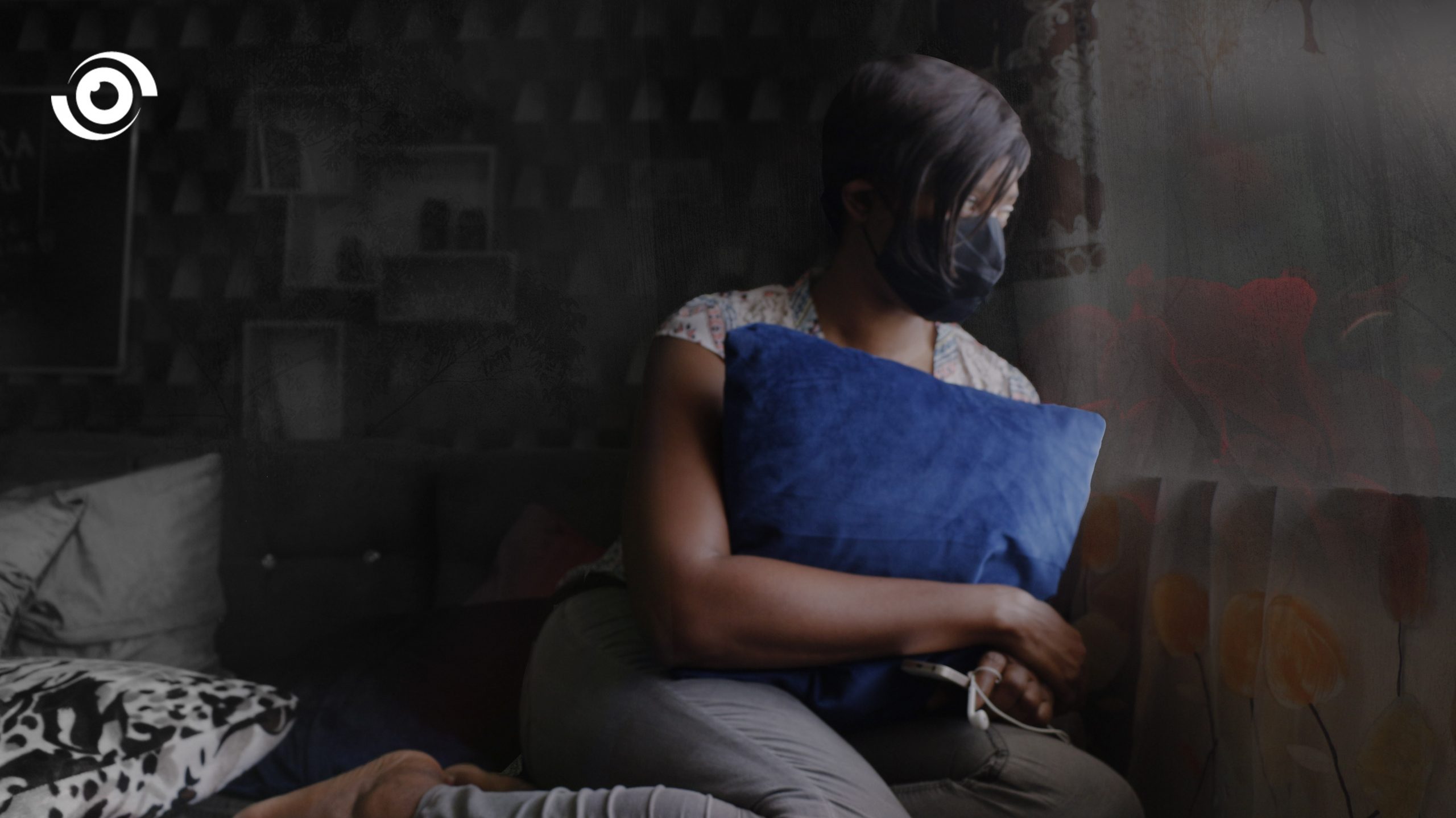By Dr. Obehioye Aimiosior (Guest Writer)
Amaka’s husband died from COVID-19. It was a rainy Tuesday afternoon and she was still dealing with the reality of not being there during his last moments. It was barely five days after his death when she received her COVID-19 result. She was dealing with the overwhelming sadness that had come with the loss of a loved one and the fear that she also might have been infected. She had to be strong for her children and still needed closure about her husband’s death.
The psychosocial aspect of health encompasses the mental, emotional, social and spiritual factors that might affect health care and its outcomes, either positively or adversely. There are a variety of factors that determine the psychosocial health of patients and in the context of the COVID-19 pandemic, might influence how patients react to the infection and their course of recovery. While it is natural to experience feelings of anxiety, stress and uncertainty as a result of the pandemic, being diagnosed with COVID-19 or admitted to an isolation centre worsens these emotions. So, in order to address the psychosocial health needs of these patients, it is important that support is provided at the time of result disclosure, during isolation in a facility and after discharge.

Although more commonly bad news is associated with terminal illnesses, a positive COVID-19 result weighs as much as every other bad news in medicine that drastically and negatively alters a patient’s view of his or her future. This may not be unconnected to the unraveling nature of the disease, widespread misconceptions, over exaggeration of severity and the widespread social stigma. There are usually varied responses to a positive COVID-19 result and this is to a large extent dependent on the psychosocial wellbeing of the patients. Conversation with a few COVID19 patients revealed that while some of them accepted the result and prepared for evacuation, others went through a rollercoaster of emotions ranging from guilt, fear of stigma/self-stigma, anger to outright denial.
It is a heavy emotional burden to feel like the one who introduced the virus into the family. Some COVID-19 patients, at the time of disclosure felt guilty that they might have infected family members, this feeling was heightened if there was a risk factor for more severe illness in a close relative. Patients even felt responsible for the death of a family member and had to deal with this feeling while trying to accept the news of their positive result. “I could not protect my son” said one patient who feared that his son, who had a background history of asthma, might have contracted the virus from him.

The all too often echo of “It is not my portion” is the initial sign of disbelief, deferral and dismissal which mimic denial. These patients revealed that at the time of result disclosure ,felt the diagnosis was mistaken and refused to accept it, thereby holding on to a false reality. In some cases, it was a short-term denial, so the patient gradually adjusted to the news. There is, however, the harmful side of denial as these individuals pose a risk to unsuspecting members of the population knowing that they would most likely flout public health advisories.
The most recurring response, however, was a request to go to the isolation centres in their own vehicle because of the social stigma associated with the branded ambulances that are sent to pick them up. These patients feared that they might be stigmatized, discriminated against following their discharge from the isolation centres, and these concerns are valid. Our concern is how this stereotype affects the self-esteem of these patients and how this prevents others from seeking healthcare immediately.
Significant changes have been made to our daily lives as a result of the pandemic and in addition to the fear of being infected with the virus, we face the new realities of working from home, loss of employment and financial hardships for a lot of families, lack of physical contacts with families and friends, unexpected losses of loved ones and the closure of schools and religious institutions. In the face of these challenges, individuals have attempted to make precautionary changes as prescribed by global and local public health authorities to minimise the risk of infection and thus contain spread.

While we advocate the need for individuals to take responsibility in protecting their mental health during this stressful and rapidly changing situation by regulating exposure to information, ensuring a healthy diet and regular diet as well social connectedness and resting optimally, there’s a need for government and other stakeholders to ensure comprehensive risk communications to the population. This will help in dispelling fears, misperceptions and stigma underlying some of these mental health challenges while empowering individuals to better protect themselves, their loved ones and their communities. While this may be led by government public health agencies, effectiveness can only be achieved through collaborations with stakeholders such as NGOs, community and religious leaders, employers as well as community members. It is also important to ensure that content, methods and channels are informed by locally generated and contextually appropriate evidence.
The psychosocial health of patients with COVID-19 as well as other members of the population remains a priority at this time. As much as physical health, protecting a person’s psychosocial health is essential to the maintenance and preservation of wholesome health. Appropriately designed and targeted risk communication strategies and activities is invaluable in this regard.
What other organisations do you know of that provide psychosocial support for Nigerians in this time? Let us know in the comments below or on our social media platforms: @nighealthwatch on Twitter, and @nigeriahealthwatch on Facebook and Instagram.
Author’s Bio: Dr. Obehioye Aimiosior is a young healthcare professional with a passion for achieving Universal Health Coverage through Health Systems Strengthening especially Healthcare Financing. She graduated from the University of Ibadan, College of Medicine, with a degree in medicine and surgery. She is a sustainable development goals advocate with a focus on SDG 3; Good health and Well-being. Obehi is currently the Vice Lead- Health for The Neo-Child Initiative, a non-profit organisation that promotes child health awareness and sustainable education to empower Nigerian Children.



All Nigerians have been traumatised. The emotional and economic impact of this pandemic on all Nigerians can not be imagined. Most Nigerians that started year 2020 with such high spirits have suffered so much devastation that they can’t even move even after lockdown has been lifted. We all need this support.